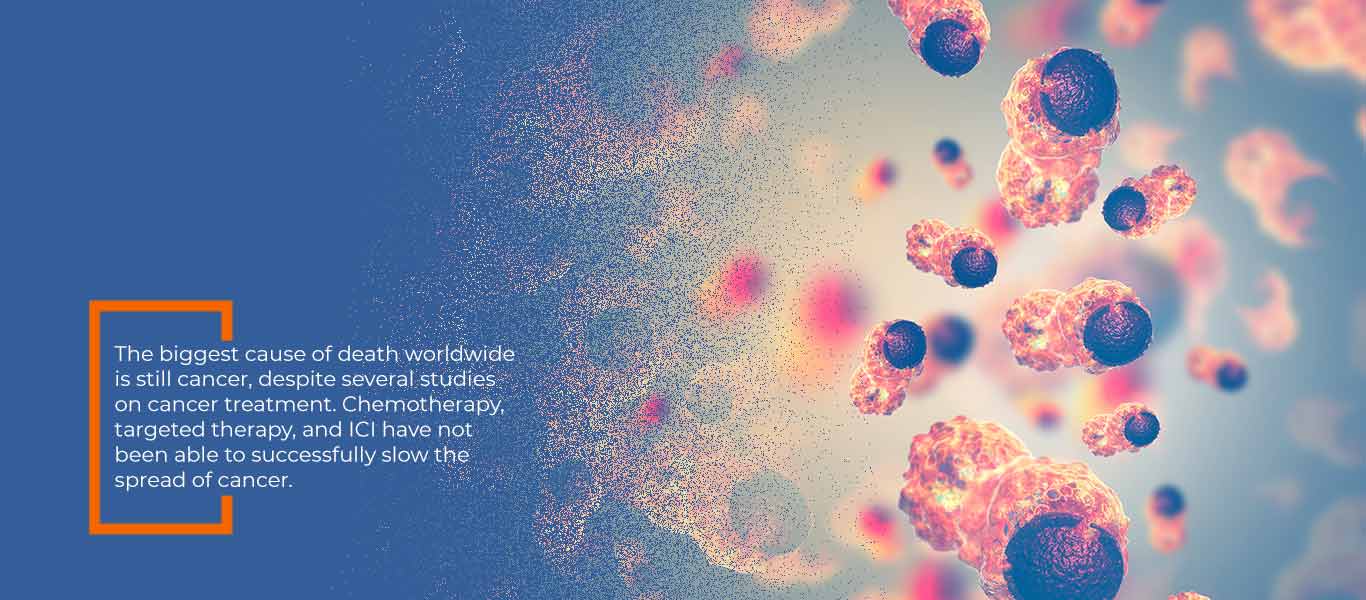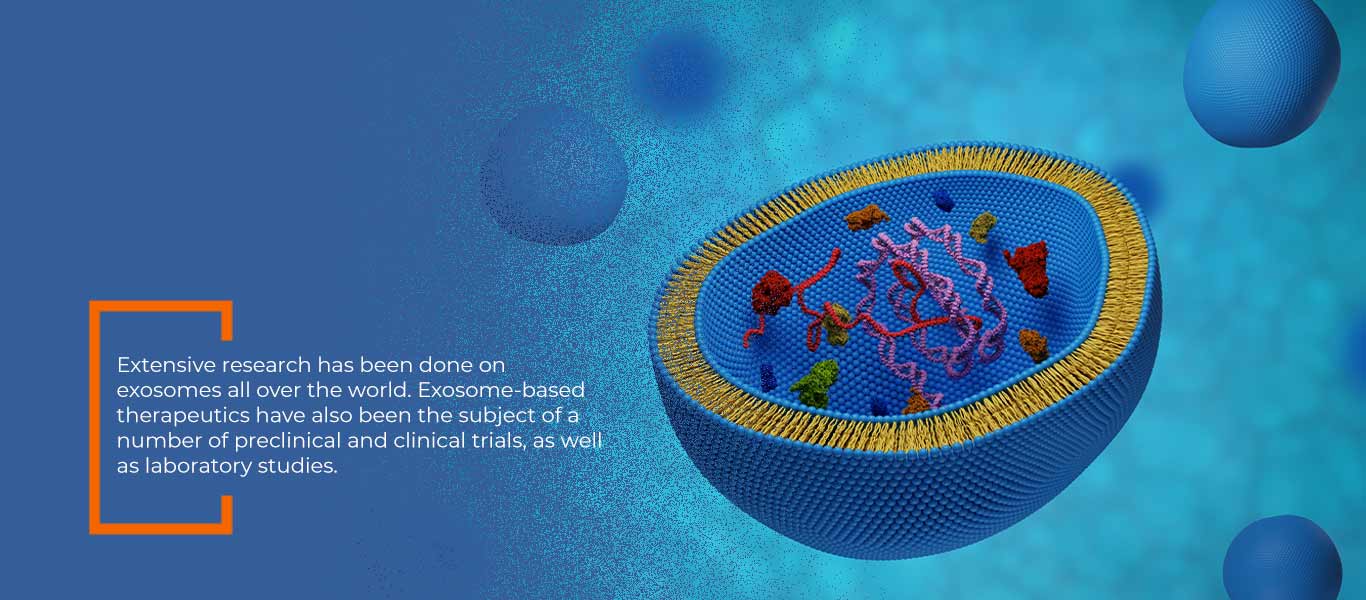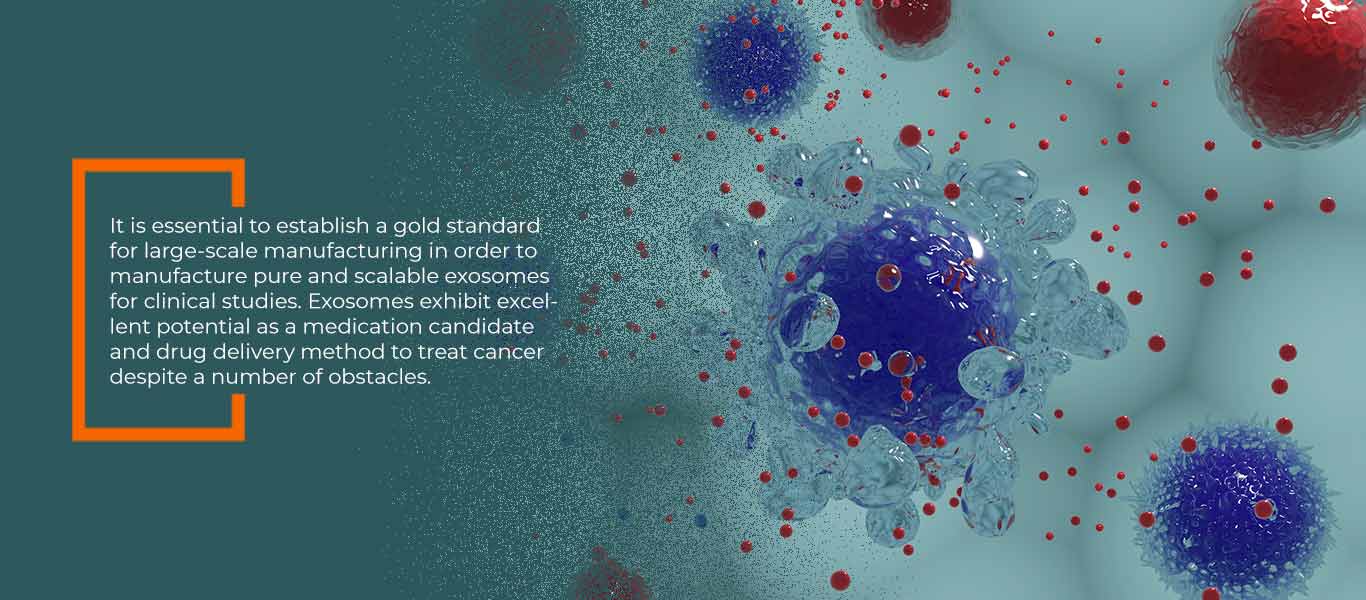The use of cell-released tiny vesicles that stimulate the immune system is of great interest at this time of rapid advancement in cancer immunotherapy. Exosomes are nanovesicles produced by cells, and because of their molecular transfer ability and immunogenicity, they hold significant potential for cancer immunotherapy. Recent technical advancements have made it possible to identify the exosome payloads that control immunological responses. Exosomes from tumor cells and immune cells, in particular have distinctive composition profiles that are crucial for anti-cancer immunotherapy. Exosomes can transfer their payload to targeted cells, which has the potential to affect the phenotypic and immune-regulation capabilities of those cells.
According to growing data over the past decade, Exosomes can participate in numerous cellular processes that contribute to cancer development and have therapeutic effects, demonstrating the dual features of promoting and suppressing cancer. Exosomes have enormous potential in the realm of cancer immunotherapy, and they may end up becoming the most effective cancer vaccines as well as carriers for specific antigens and medications. Controlling the spread of cancer requires understanding how exosomes might be used in immune therapy. Exosomes also have implications for diagnostics and the creation of new therapeutic approaches.
Data Bridge Market Research analyses that the market is growing with a CAGR of 16.9% in the forecast period of 2022 to 2029 and is expected to reach USD 1,602.54 thousand by 2029 from USD 468.98 thousand in 2021. The rising prevalence of chronic inflammatory autoimmune diseases and technological developments in exosome therapeutics are likely to be the major drivers that propel market demand in the forecast period. The global exosome therapeutics market is segmented on the basis of type, source, therapy, transporting capacity, application, route of administration, and end user. U.S. is expected to dominate the global exosome therapeutics market due to the presence of FDA-approved wound debridement devices, the presence of health remuneration policies, rise in chronic wounds, and rise in the elderly population.
To know more about the study, visit: https://www.databridgemarketresearch.com/reports/global-exosome-therapeutic-market
Background
The top cause of death worldwide and a significant public health issue, cancer is increasing quickly both in incidence and mortality. Currently, 9 million cancer deaths and about 18 million new cases are anticipated annually. Surgery, chemotherapy, radiation, and targeted therapy are the main cancer treatments used today. However, despite being the most significant and effective therapeutic approach for treating cancer, chemotherapy and/or radiotherapy can also result in unpleasant reactions, drug resistance, and long-term problems. Given the tremendous improvements in drug screening technology, there is now a growing interest in the creation of oncology drugs that can solve these issues by utilizing a novel cancer therapy approach.
Cancer immunotherapy is a therapy that suppresses and eliminates tumors by controlling the immune system to reactivate the anti-cancer immune response and block the tumor escape pathway. Non-specific immune activation, immune checkpoint blockades, adoptive cell transfer, and vaccination techniques are the key therapeutic options. The U.S. Food and Drug Administration (FDA) has authorized the use of a number of immunotherapy medications, including programmed cell death 1 (PD-1) and programmed cell death 1 ligand 1 (PD-L1) inhibitors, cytotoxic T-lymphocyte-associated protein 4 (CTLA-4) inhibitors, and others.
Exosomes are single-membrane organelles that range in size from 30 to 100 nm and can be secreted by a variety of cells, including immunological and cancerous ones. Exosomes primarily consist of proteins, lipids, glycoconjugates, and nucleic acids that are derived from cells. Exosomes perform a wide range of functions, including modifying the extracellular matrix (ECM) and serving as a conduit for the exchange of signals and chemicals between cells. The dual properties of exosomes in promoting and suppressing cancer have been taken into consideration with the research of the many functions exosomes play in the course of cancer. Exosomes, which are cell-derived nanovesicles, may be used in cancer immunotherapy because to their immunogenicity and molecular transfer capabilities.
As it strengthens the immune system, can be used to treat a variety of malignancies, and has a long-lasting effect, cancer immunotherapy has recently been a research hotspot. It has demonstrated potent anti-tumor action in numerous malignancies, including melanoma, non-small cell lung cancer (NSCLC), and kidney cancer. Exosomes produced by cancer cells can modify several stromal cell types to support the development and invasiveness of cancer cells as well as trigger endothelial cells' autocrine VEGF signaling to support tumor angiogenesis. Exosomes can also express substances like PD-L1 and transforming growth factor (TGF) that play a role in immunosuppression. Exosomes produced by cancer can prevent CD8+ T cells from growing and being activated while encouraging the growth of regulatory T cells, which can then function to suppress the immune system.
Additionally, exosomes have lately been found to have some unexpected anti-cancer abilities. Major histocompatibility complex class I molecules (MHC I) and tumor markers such as heat shock proteins (HSP), which are involved in antigen presentation and stimulation of T cells and have been demonstrated to trigger CD8+ T cell-dependent anti-tumor responses in vitro and in vivo, have been found to be highly expressed in dendritic cell (D.C.)- and tumor-derived exosomes. Exosomes' potential use in immune therapy is crucial for understanding how cancer progresses since they act as carriers for anti-cancer immune responses and medication delivery. This has implications for diagnostics and the creation of novel therapeutic approaches.
Clinical Applications
Numerous clinical trials using exosomes have been carried out as a result of substantial study into the function of exosomes in cancer immunotherapy and their importance as diagnostic and therapeutic targets. In light of the function of TAEs in boosting cancer cell survival and proliferation, a novel method of cancer treatment involves focusing on TAE dysregulation pathways, such as the heparinase/syndecan-1 axis. Exosomes are also employed in immunotherapy as therapeutic indicators. The longer progression-free survival of patients with malignant glioma after anti-survivin immunotherapy may be associated with the decreased release of CD9+/GFAP+/SVN+ and CD9+/SVN+ exosomes.
Exosome DNA (ExoDNA), which is produced by tumour cells, may also activate immune cells via the STING/cGAS pathway. As a result, ExoDNA may control both tumour immunity and function as a critical regulator of checkpoint immunotherapy. Exosomes are used as drug delivery vehicles for the treatment of cancer, immunotherapeutic vaccines, and markers of cancer diagnosis, prognosis, recurrence, and metastasis in ongoing clinical trials. Exosomes have been investigated in pancreatic cancer as immunotherapeutic vaccines, including DEX paired with cyclophosphamide for NSCLC, TAEs combined with an antisense molecule against glioma, and mesenchymal stromal cell-derived exosomes with KrasG12D siRNA (iExosomes).
According to many clinical investigations, exosomes may be used as diagnostic, prognostic, and therapeutic indicators for lung, prostate, renal cell, gastric, breast, gallbladder, pancreatic, and rectal cancers. Clinical experiments have confirmed the efficacy and safety of exosomes as curcumin carriers for the treatment of colorectal cancer. Exosomes are therefore anticipated to serve as biomarkers, medication carriers, and immunotherapeutic vaccines for a range of malignancies based on the available experimental data and clinical trials.
Advantages of Exosomes for Cancer Therapy
Exosomes are less toxic and immunogenic than synthetic nanoparticles because they are more biocompatible with the body and biodegrade more quickly. Although other cell-derived E.V.s are equally biocompatible, their drug loading and administration use was constrained since they were larger and more diverse than exosomes. Since most cell types are capable of producing exosomes, exosome production is similarly simple. Exosomes can easily escape lung clearance and cross the blood-brain barrier because they are stable in biological fluids and are tiny enough to do so. Exosomes adhere and internalize within tumor cells at a rate that is ten times greater than that of liposomes of comparable size, suggesting that exosomes are more specifically targeted against cancer.
Additionally, nanometric exosomes aggregate in tumor tissues with improperly formed blood vessels more so than in normal tissues due to higher permeability and retention effects. As a result, exosomes can more effectively distribute drugs by reaching the majority of solid tumors. Exosomes can also be modified to contain tumor-targeting peptides, antibodies, or proteins for precise medication delivery and therapeutic nucleic acid delivery. These qualities make exosomes one of the combined top contenders for cancer targeted therapy.
Exosomes are a relatively new area of study, but they have generated a lot of attention in the field of cancer therapy due to their potential applications as new, low-toxicity immunotherapy inhibitors, prospective cancer indicators, or a safer and more effective way to administer anti-cancer medications. Exosomes are a type of tiny extracellular vesicle that can be released into the extracellular environment by immune cells or tumor cells. Recent updates to the evidence that exosomes can exhibit immunomodulatory features and function as possible therapeutic agents are the result of growing studies. Exosomes also play crucial functional functions in the transfer of proteins, nucleic acids, and lipid contents, which supports intercellular communication and immune system control.
Future Directions and Conclusions
Exosomes have a promising future in cancer therapy because of their function in the development of cancer and their unique biological characteristics. Exosome-based cancer therapies have been explored and developed in a variety of ways, including exploiting exosomes naturally produced by immune cells to suppress cancer cells, preventing exosomal activity produced by cancer cells, and employing exosomes as gene/drug carriers. There are, however, a lot of problems to be resolved. First, it is still unclear how exosomes from various sources differ from one another. Second, the required number of exosomes for a therapeutic effect may vary dramatically between cancer types. Third, tumor heterogeneity and scalability may affect the effectiveness of treatment.
Additionally, the many roles of exosomes produced from various sources are not entirely understood. Furthermore, it is yet unknown how exosomes might be altered to have a high level of selectivity to particular cancer cells. Last but not least, how exosomes are stored and maintained is still unclear. In light of these difficulties, it is imperative to carefully analyze exosomes originating from various cells/tissue in order to select the cells that would work the best for a given cancer therapy. In order to construct exosomes as highly selective drug carriers for cancer cells, it is also necessary to discover the unique cancer cell surface indicators. Exosome-based cancer treatment may also need to be combined with other methods due to the complexity and heterogeneity of the tumor.
Finally, to ascertain the effectiveness of the application, clinical trials of exosome-based cancer therapy are immediately required. Exosomes clearly promise innovative and significant applications for the treatment of cancer, despite the fact that there are still obstacles to overcome.
Exosome-based approaches have been shown to improve anti-cancer immunotherapy, although the evidence for their practical use in cancer patients has only produced minor advantages. Before exosomes may reach their full clinical potential, there are still several challenges with their separation, synthesis, biocompatibility, and manufacturing processes. First, there are no limitations on exosome synthesis and purity because most exosomes are currently extracted from complicated biological fluids (such plasma) and cell culture supernatants. Furthermore, there are currently no particular worldwide guidelines for managing the manufacturing and use of this novel kind of therapeutic agent, and exosome-based immunotherapy is still in the early stages of clinical trials.
According to WHO, cancer is a top cause of death globally, accounting for approximately 10 million deaths in 2020. Data Bridge Market Research analyses that the exosome research products market which was USD 0.55 billion in 2022, would rocket up to USD 2.26 billion by 2030, and is expected to undergo a CAGR of 19.3% during the forecast period 2023 to 2030. In 2020, Lonza acquired exosome facility of Codiak Biosciences. The latter kept its pipeline of therapeutic candidates and exosome drug-loading technologies. Asia-Pacific is expected to grow at the highest growth rate in the forecast period of 2023 to 2030 because of increasing expenditure of healthcare infrastructure, growing investments for R&D activities and increased focus of the government.
To know more about the study, visit: https://www.databridgemarketresearch.com/reports/global-exosome-research-products-market












